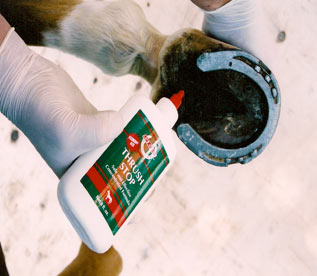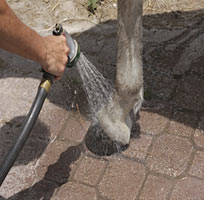 |
|
How to Treat Chronic Thrush in Horses! By Ray Tricca and SBS Equine
 |
Field Trials reveal steps to treating chronic thrush and help keep it from coming back.
At the end of 2009, The Horse-Journal published the results of field trials that on the leading thrush
remedies. The study also summarized the most important steps in treating thrush, such as cleaning out
the foot and removing diseased tissue. Regardless of what thrush products you use, using these steps will help prevent chronic thrush and other hoof infections.
How serious is the thrush on your horse? Thrush can be classified in anyone of three categories:
Mild Thrush
The Horse-Journal went on to say that most of the thrush remedies they tested were effective against
mild thrush. Mild thrush is often recognized by its obvious black discharge and odor with no deep tissue
layer invasions. There is no pain or lameness observed from the hoof. Mild thrush sits near the surface and is easy to kill, sometimes with one application of a cleaning agent.
Moderate Thrush
Moderate thrush has the black discharge and odor along with some pain observed coming from the heel
tissue. This is usually an indication of a more deeply rooted infection. The Horse-Journal said
that copper and iodine based products work well on moderate thrush, but they can also be caustic to
tender tissues and slow healing. We believe that repeated daily use of some caustic agents can be
counter-productive. The hoof condition can be made worse because the treatment can kill the microbes and healthy new tissue at the same time. This can retard the healing process.
Severe Thrush
There is severe pain and lameness associated with severe thrush with obvious involvement of deep tissue
. Severe thrush is chronic when it is so deeply rooted that it becomes difficult to kill microbes without
harming surrounding tissue. Repeated attempts to kill chronic, or deeply rooted infections with
traditional ingredients, most of which are caustic, were shown in the field trials not to be very effective against severe thrush.
At the conclusion of the study, the Journal said that only one product (SBS Thrush Stop) defeated some
chronic cases that nothing else could touch, yet was gentle to tender hoof tissue. They repeated the test
weeks later on chronic cases and came up with similar results. They liked the way the product formed a
barrier and had a long-lasting effect. The Horse-Journal said, “Thrush Stop is our No. 1 choice for thrush”.
Some people wondered, “how could a product be strong enough to kill deeply rooted chronic thrush
without harming tender hoof tissue?” We asked the researchers who developed Thrush Stop, what was
their secret? It not only is an interesting story, but it also may provide a clue on how to successfully
defeat chronic thrush and white line disease, which is another deeply rooted infection.
Necessity is the Mother of Invention!
Twenty five years ago, Dr. Rick Shakalis went to pick up his daughter at the local horse stable. Like
many other young girls her age, she was responsible for grooming her own animal. The stable manager
said that her horse, Coco, had a stubborn case of thrush and recommended that his daughter use some of the products that they kept around the barn.
When Dr. Shakalis read the ingredients on the labels, he realized that many of those products were
caustic, hazardous, or ineffective against bacteria. He said “there must be a better way”. Dr. Shakalis
went to his lab with his business associate, Dr. John Pautienis, and they formulated a thrush remedy that
was both safe and effective. A new company (SBS Equine Products) was born that day with a mission statement.
Strategy
The goal of the SBS Researchers was to kill deeply rooted thrush without harming the surrounding
tender hoof tissue. Caustic agents kill microbes, but they can also hinder the hoofs natural defense which
is tissue rejuvenation. A normal hoof will grow 3/8” in a month. They defined the thrush as a bacterial
infection, not a fungus as it is in the human fingernail. They knew that bacteria thrive in moist
environments that are dark and low in oxygen. The clefts of the frog are the perfect place for the bacteria to hide because they are often packed with muck and urine soaked manure.
Dr. Shakalis said Thrush Stop works so well for the following reasons:
(1) The key active ingredient acts like a birth control pill for bacteria. The bacteria can’t reproduce so
they die out naturally without harming surrounding tissue. Being a non-caustic formula, it allows the
healthy tissue to thrive and grow out. Over-use of products containing caustic agents can be harmful to tender new tissue and hinder growth.
(2) The active ingredients allow the formula to form a barrier which binds to the hoof protein for long
lasting protection. The Horse-Journal noted this product feature in their report.
(3) The formula also contains a drying agent which helps destroy the place where the microbes like to hide.
The packaging for Thrush Stop is also important to its success. The long neck twist cap can get the
ingredients deep into the cracks and crevices where the organisms thrive. Aerosols or sprays that sit on the surface are not as effective at reaching hiding places.
Summary
Chronic thrush is deeply rooted and is impossible to kill with one application of a strong topical agent.
Repeated use of these strong chemicals can be harmful to the surrounding healthy hoof tissue and slow
the healing process. The SBS researchers developed a formula that targets bacteria and fungus without
harming sensitive tissue. The product is not caustic and can be used as often as necessary to keep thrush under control and allow hoof tissue to thrive and prosper
Regardless of the thrush remedy that is used, the most important steps in dealing with thrush are cleaning
and trimming. Removing the diseased tissue and opening up the flaps of the frog by your farrier will give
you a head start to recovery. Improperly trimmed hoofs prevent oxygen from getting in crevices.
Frequent cleaning can help keep thrush and white line disease under control.
 |
Wash the Hoof
Pick & Brush
Wipe & Dry

Apply Thrush Stop
Article Video Support Here
Contact: Our Friendly Staff
3888 Mannix Dr., Unit 303
Naples, Florida 34114
Phone: 239-354-3361
Email: info@sbsequine.com
Website: sbsequine.com |
 |
 |
 |
 |
 |
|
To advertise your horse product or service, contact Ann
|
|
|
|
InfoHorse.com, Horse Information Lives Here ® 2/23/2026
Contact Us to Advertise to over a
million Horse Owners.
All images and content Copyright© 2012 by InfoHorse.com, Equusite.com.
|
|
|
|
Articles, Academic Schools, Arena Maintenance, Animal Communicators, Barns, Barn and Accessories, Barn Equipment and Tractors, Breast Collars, Grooming Products for Horses, Hay Feeders, Horse Blankets, Horse Books, Horse Videos, Horse Breeders, Horse Camping Gear, Career Schools, Carts and Buggies, Horse Training Clinicians, Equestrian Clothing, Dogs and Puppies, Horse Fencing, Western Art & Furniture, Horse Property for Sale, Horse Products For Sale, Fly Control, Foal Care, Horse Footings, Horse Gifts, Horse Health and Nutrition, Hoof and Leg, Horse Insurance, John Lyons Certified Trainers, Equine Lawyers, Leather Care, Links, Horse Property, Horse Photography, Portable Horse Stalls, Arenas and Roundpens, Horse Riding Schools, Horse Schools, Safety Products, Services for Horses, Horse Trailers, Horse Shipping, Horse Skin Coat Care, Horse Software, Specialty Trainers, Horse Summer Camps, Tack, Horse Trainers, Treats and Snacks, Truck Accessories, Trucks, Horse Vacations, Western Lifestyle, jewelry
|
|
|
|